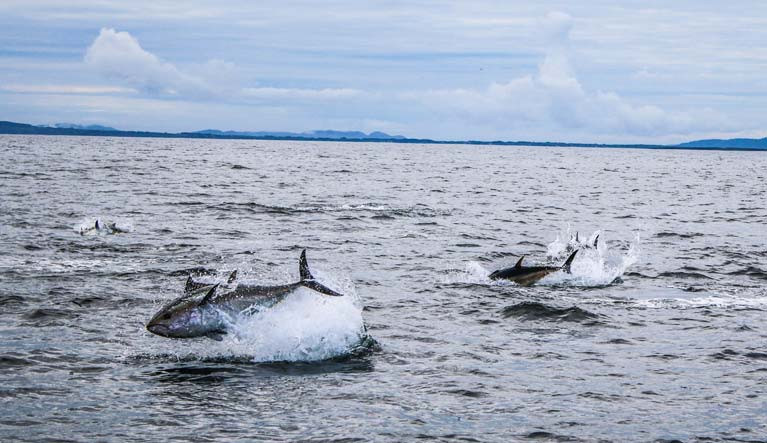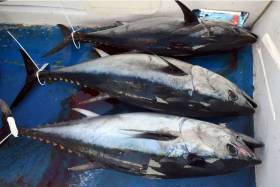Displaying items by tag: Blue fin tuna
Eight EU Member States Working with EFCA on Bluefin Tuna Monitoring - Ireland Still has no Quota
The European Fisheries Control Agency (EFCA) is coordinating the monitoring of the bluefin tuna catch this season with eight member states involved in the fishery.
Control and inspections will be pooled among the eight-member states – Croatia, Cyprus, France, Greece, Italy, Malta, Portugal, and Spain –the EFCA has said.
“This species has been subject to new management and control measures adopted in 2021 by the International Commission for the Conservation of Atlantic Tunas (ICCAT) and the fishery is subject to a joint scheme of international inspection in international waters,” the EFCA has said.
Ireland does not have a quota for bluefin tuna, although fishermen have reported sizeable shoals of the migratory species in Irish waters for part of the season over the past few years.
Ironically, under the EU/UK Trade and Co-operation Agreement, a share of the EU's bluefin tuna quota (0.25%) has been transferred to Britain.
Last year, Minister for Marine Charlie McConalogue told the Dáil, that landings of bluefin tuna taken from the Irish exclusive economic zone (EEZ) were “very small in relation to the total bluefin tuna landings, with the majority in the North East Atlantic coming from the Bay of Biscay area”.
He said fishery data did not specify catches on the basis of EEZ details.
However, he said an analysis of the most recent publically available dataset by the Marine Institute for the period 2015 to 2018 showed landings of between 37.8 tonnes (2015) and 31.8 tonnes (2018) caught in the Irish EEZ.
He said the average annual EU quota for the East Atlantic and Mediterranean - the management area for the stock - was 12,470 tonnes over this period.
The Marine Institute has developed a programme to satellite tag bluefin tuna, working with partners, including Stanford University USA, University of Acadia Canada, Trinity College Dublin and ICCAT.
A catch-tag-release science-based fishery for authorised recreational angling vessels has been in place in Ireland since 2019.
Mr McConalogue said the catch-tag-release programme supports the collection of valuable data on the migratory patterns of bluefin tuna in Irish waters. He said it would supplement the ongoing research that is being undertaken by the Marine Institute.
“The available bluefin tuna quota is allocated each year to Member States on the basis of relative stability as established in the late 1990s. At that time, Ireland did not have a track record of commercial fishing for Bluefin Tuna and, accordingly, did not receive a quota allocation,” Mr McConalogue told the Dáil on April 21st, 2021.
He said he was “committed to doing all possible” through the forthcoming review of the Common Fisheries Policy to “secure additional quota where possible for Irish fishers”.
“I will consider how Ireland will prepare for and participate actively and effectively in the review, including the interaction with stakeholders to prepare Ireland's case and identify priorities,”he said.
New Bluefin Tuna Catch & Release Programme to Run this Summer
A new scientific catch and release tagging programme for Atlantic bluefin tuna will authorise up to 25 qualifying angling skippers to participate, Inland Fisheries Ireland (IFI) says.
As Afloat reported yesterday, the new Tuna CHART (Catch and Release Tagging) programme run by the IFI and the Marine Institute will open for applications on February 18th, with a closing date of March 6th.
The scientific catch and release fishery will run from July 1st to November 12th this year, and may also operate in 2021 and 2022, IFI says.
A pilot programme last year authorised 15 charter angling vessel skippers, who were trained to tag, measure and record bluefin data.
A total of 219 bluefin tuna were caught, tagged and released during the three months 2019 programme, IFI says.
“ As many as eight bluefins were tagged on one fishing trip,” it says, and “all tuna were carefully handled subject to strict guidelines set by the Tuna CHART programme and all were released alive”.
“Data from the tagging programme is being collated by the partnership, which also involves the Sea Fisheries Protection Authority, the Department of Agriculture, Food and the Marine (DAFM) and the Department of Communications, Climate Action and Environment (DCCAE).
The collated data will be reported to the International Commission for the Conservation of Atlantic Tuna (ICCAT).
Atlantic bluefin tuna is the largest of the species and frequents Irish coastal waters to feed during its annual migration through North Atlantic waters.
“ The bluefin tuna is prized by sea anglers for its power and fighting ability and is a very valuable commercial species,” IFI says.
“The core aspect of the Tuna CHART programme is the welfare and successful release of the bluefin tuna,” it says, and authorised skippers will be required to have high specification rods, reels and line in advance of the open season.
“ Data collection for scientific research is the primary purpose of this fishery and will continue to be a key requirement for skipper participation in this scientific catch-and-release fishery. Skippers will be required to collect data on every bluefin trip undertaken and each bluefin tuna they catch, tag and release,” IFI says.
It says a call for applications for the 2020 fishing season will be announced on February 18th, 2020 and the last date for the receipt of a completed application will be 13:00 on March 6th.
Applications can be made here
The European Commission has given Ireland three months to conduct an inquiry into its application of EU Common Fisheries Policy rules writes Lorna Siggins
The administrative inquiry must “evaluate” Ireland’s “capacity to apply the rules” which govern management of fish catches within EU waters off this coast.
The European Commission says that its official request arises from “the severe and significant weaknesses detected in the Irish control system during an audit carried out by the Commission in Ireland in 2018”.
The EU audit identified shortcomings related to the “effective control of the weighing of catches of small pelagic (mackerel/herring) species, and issues related to underreporting of catches of these species”, the Commission says.
It also identified the “inadequate and ineffective sanctioning system for offences committed by operators and the lack of control and enforcement of bluefin tuna catches by recreational vessels”, it says in a statement.
The audit of monitoring - which is conducted by the State’s Sea Fisheries Protection Authority (SFPA) - was carried out by EU officials in March, 2018, in the largest fishing port of Killybegs, Co Donegal.
The auditors scrutinised weighing systems in seven fish factories in Killybegs, and analysed monitoring of the fleet of large pelagic vessels, some of which were found to have under-recorded storage capacity in 2014 and 2015.
The audit also identified the State’s failure to control a recreational fishery for bluefin tuna.
It found evidence that some tourist trips advertised over the internet resulted in bluefin tuna being “kept, landed and offered for sale” in breach of regulations.
Warnings of weaknesses in relation to pelagic monitoring had been flagged in a review of Ireland’s fishery control regime commissioned back in 2007 by the then Department of Communications, Marine and Natural Resources.
The 2007 review by consultants had advised that weighing of pelagic fish should primarily be undertaken at the quayside. It said weighing in factories should only continue where “strict additional control assurances” were implemented.
The Commission says Ireland’s administrative inquiry should “focus on the collection of information on these specific findings to enable the Commission to further evaluate Ireland's capacity to apply the rules of the CFP, and to assess the potential consequences of any failure to do so”.
It says the three month deadline may be extended “for a reasonable delay by the Commission, on a duly reasoned request from Ireland”.
“ After that period, the Commission will analyse the information provided by Ireland and identify if any further steps or actions are needed,”it says.
In a letter some months ago to Dr Cecil Beamish of the Department of Agriculture, Fisheries and Food, the European Commission’s fisheries directorate, DG Mare, said that a “follow up” by Ireland to address the audit findings was “imperative” as a “matter of urgency”.
Ireland defended its approach in its response to last year’s audit, but made a number of commitments – including hiring more SFPA staff and developing a protocol with the Director of Public Prosecutions.
The SFPA noted difficulties with weighing fish at the pier, as this can affect quality, and therefore value, and the method is opposed by the industry for this reason.
It said that it “operates a broad matrix of official controls”, but conceded that “total control is not possible and no single step ensures zero-risk of under declaration”.
The SFPA referred comments to the Department of Agriculture, Food and Marine. The department said the Commission's request had just been received and "is being examined".





























































